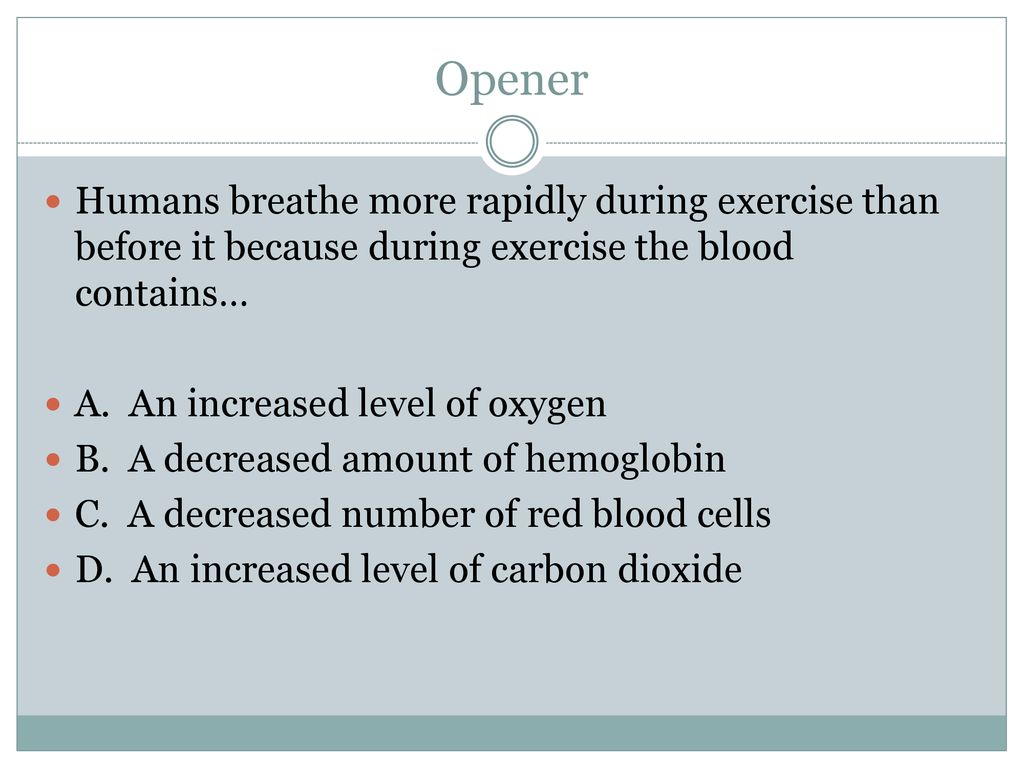Humans Breathe More Rapidly During Exercise Because the Blood Contains
At the point when exercise can be controlled this requirement is met essentially by aerobic means. Traditionally the increase in ventilation and gas exchange during a bout of constant-load submaximal exercise is divided into three phases Fig.

Respiratory System Review Ppt Video Online Download
Your blood transports these metabolic gasses to and from your tissues.

. A decreased amount of hemoglobin 9. Deposits from cigarette smoke are most likely to interfere with the ciliated mucous membranes located in both the. Faster deeper breathing exhales more carbon dioxide 3.
This means that women use more energy when breathing because a significantly greater part of total oxygen is directed to the respiratory muscles. The human trachea is prevented from collapsing by the presence of A. A condition that would directly result in the production of lactic acid by cells in the human body.
The simple answer is that oxygen comes from blood. The rate and depth of breathing increases - this makes sure that more oxygen is absorbed into the blood and more carbon dioxide is removed from it. A decreased amount of hemoglobin.
Blood vessels surrounding air sacs. An insufficient amount of oxygen reaching the cells. Now that takes us to the point why the heart rate increase during exercise.
Answer 1 of 1. Aerobic endurance exercise could play an important role in the evolution of Homo sapiens and oxygen was not important just for survival but it was crucial to redox-mediated adaptationThe metabolic challenge during physical exercise results. The regulation of the pH of the blood is a precise process.
An increased level of carbon dioxide. During exercise we need to breathe more often. CO2 makes the blood slightly more acidic which makes a person feel short of breath which makes them breathe more.
When the blood has too much or too little acid the results are known as acidosis and alkalosis respectively. Aerobic energy production in muscles results in increased gas exchange at the lungs because more oxygen is taken in and more carbon dioxide is released according to an article published in the journal Breathe in March 2016. So per minute heartbeat is also increased.
When you are exercising your heart pumps harder and faster to provide more blood and hence oxygen to your muscles. An increased level of carbon dioxide. Because during exercise metabolic activities are increased and as a result more oxygen is required and more CO 2 is produced.
When you exercise and your muscles work harder your body uses more oxygen and produces more carbon dioxide. Your blood transports these metabolic gases to and from your tissues. Blood contains the oxygen the muscle needs during exercise and it is only the heart can supply the blood.
The complexity of human DNA has been affected by aerobic metabolism including endurance exercise and oxygen toxicity. The speed and depth of breathing regulates the amount of carbon dioxide that is exhaled 2 3. Likewise maneuvers that increase the work of breathing and thus the demand for blood flow by the respiratory muscles have been shown to cause reductions in leg blood flow during heavy exercise.
During an infection the blood delivers more immune cells to the site of infection where they accumulate to ward off harmful invaders. The content should contain information about the breathing responses to constant-load and incremental exercise tasks and the blood-gas changes that occur. Humans breathe more rapidly during exercise because more oxygen is needed inhalation and carbon dioxide must be removed exhalation.
A decreased number of red blood cells. Through the circulatory system blood adapts to the bodys needs. The process through which blood is circulated to the body and muscle is known as the heartbeat.
The heart rate increases during exercise. However as noted earlier the effects of adding arm exercise to ongoing leg exercise can be complex and contradictory. To cope with this extra demand your breathing has to increase from about 15 times a minute 12 litres of air when you are resting up to about 4060 times a minute 100 litres of air during exercise.
An increased level of oxygen. Humans breathe more rapidly during exercise than before it because during exercise the blood contains A. Blood circulation is also increased during exercise which also increase the heart rate.
Humans breathe more rapidly during exercise than before it because during exercise the blood contains. Humans breathe more rapidly during exercise than before it because during exercise the blood contains. An increased level of oxygen B.
Regulates breathing rate by its effect on the medulla. More carbon dioxide that needs to be gotten rid of. Vigorous energy generation in muscles brings about an increase in the gas exchange rate in the lungs since more oxygen is taken in and more carbon dioxide is discharged.
Why Does Heart Rate Increase During Exercise. Humans breathe more rapidly during exercise than before it because during exercise the blood contains An increased level of carbon dioxide What is the major difference between red blood cells and white blood cells. An increased level of carbon dioxide D.
A decreased number of red blood cells C. Humans breathe more rapidly during exercise than before it because during exercise the blood contains. That is why rapid breathing starts to get more oxygen and excrete CO 2.
71 Humans breathe more rapidly during exercise than before it because during exercise the blood contains a an increased level of oxygen b a decreased number of red blood cells c an increased level of carbon dioxide d a decreased amount of hemoglobin.

Circulatory System Respiratory System Excretory System Ppt Download

Review 7r Circulatory Respiratory Systems 1 Which Part Of The Human Blood A Is The Most Numerous B Contains A Nucleus C Is Produced In The Bone Ppt Download
No comments for "Humans Breathe More Rapidly During Exercise Because the Blood Contains"
Post a Comment